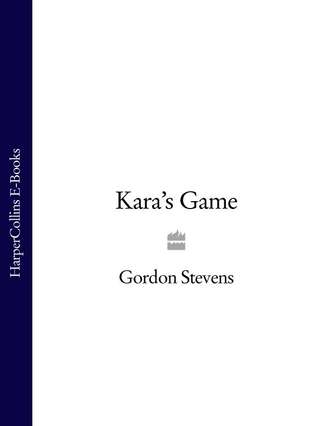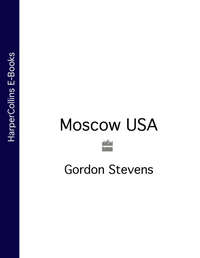
Полная версия
Kara’s Game
‘Or?’
‘She’s disregarded Air Traffic Control and turned left, which would be the normal route in. Then she’d head south at an angle till she picks up the ILS beam, turn right, and follow the beam into Heathrow.’
‘Over London?’
‘Yes. Over London.’
‘And as of this moment, all other air traffic into and out of Heathrow has been stopped.’
‘Yes.’
‘So the only plane which will fly over London in the next twenty minutes is Lufthansa 3216?’
‘Yes.’
The cloud was around them. ‘Locking on to ILS,’ Maeschler told her. ‘Beginning final approach.’ The Boeing banked gently to the right, the cloud thinned and the ground was suddenly visible beneath them. The green of the fields below them, the silver of the Thames snaking away from them, and the grey of London in front of them.
…The next time the United Nations lets your people down you must have something the world wants, he had told her … The next time the UN fails you, you must have something which makes the world afraid of you …
CNN, BBC and ITV were all already transmitting pictures from Heathrow, BBC cutting with shots from Parliament Square, and ITV mixing with aerial shots of London from an Aero Spatiale Twin Squirrel jet helicopter.
So what are you thinking, Finn?
I’m thinking that I’m at the top of the ladder. The night’s black as hell around me and the aircraft door is in front of me. Steve to my left, Jim and Ken tight behind; Janner and his team at the rear door, the helicopter hovering over the flight deck of Lufthansa 3216, the ops major counting down and the diversion about to go in. I’m in first, that’s what I’m thinking. I go right, start looking for the hijackers. Steve goes left and checks the flight deck and toilet. Jim covers me and Ken covers Steve.
Although that’s not all I’m thinking.
What do you mean, Finn? What are you really thinking?
‘Lufthansa 3216 is approaching from the east.’ The radio presenter tried to stifle the excitement in his voice. ‘We are receiving reports that Lufthansa 3216 has passed over the Thames flood barrier and is about to fly over the City.’
‘We have first pictures of Lufthansa 3216,’ the voice of the ITV presenter was suddenly urgent, suddenly dramatic, the monitor showing the shot from the Twin Squirrel, the Boeing slightly below it.
Christ she’s low, Finn thought. The television images were almost unreal – the empty runways at Heathrow, the people in Parliament Square, their faces turned up and their eyes searching the sky to the east. The aerial shot from the helicopter of Lufthansa 3216 tracking up the river.
Docklands was below her, Tower Bridge in front then suddenly below, and Westminster and Big Ben drawing her in as if she was on a piece of string.
Finn glanced at the BBC pictures from Westminster – the sky empty in the background and the Palace of Westminster in front, Big Ben to the right and the Churchill statue to the left.
‘Lufthansa 3216, this is Heathrow Tower.’
‘Heathrow Tower, this is Lufthansa 3216.’ Maeschler, the captain, husband of a beautiful wife and father of two pretty children – the papers had found out and published a family photograph. Maeschler the hero who’d landed 3216 at Schipol even though the authorities had tried to stop him.
‘3216, you are cleared to land.’
There was a slight delay.
‘Thank you, Heathrow Tower.’ Not the captain this time.
It’s not the critic who counts … she remembered the words he had quoted at her, remembered again the corridor of the hospital. The doctors white with exhaustion, the nurses dropping with fatigue, and the United Nations still doing nothing to stop the shells falling on them. It’s not the one who points out how the strong man stumbled or how the doer of deeds might have done them better …
‘I can see Lufthansa 3216 …’ The radio reporter had slipped through the police cordon and was standing on Westminster Bridge. ‘Lufthansa 3216 is coming up the Thames towards me …’ The Boeing was suddenly in shot on the pictures from Parliament Square, suddenly approaching Westminster. Passing over Parliament and framed for one incredible moment between Big Ben and the Churchill statue.
The credit belongs to the man who is actually in the arena, he had told her … Who strives valiantly and spends himself in a worthy cause … Who, if he wins, knows the triumph of high achievement and who, if he fails, at least fails while daring greatly …
What had he said the motto was?
Who Dares Wins.
Finn left the building and stood on the tarmac looking east. Heathrow was like a ghost around him, the skies and runways empty.
So what are you really thinking, Finn?
You know what I’m thinking.
Tell me anyway.
I’m thinking about a winter night behind the lines in Bosnia. I’m thinking about how the United Nations blew Kev and Geordie John to Kingdom Come that night. How Janner and Max only survived because someone who didn’t know them risked everything to save them, even though she didn’t have to. I’m thinking about how I told her that I owed, that the regiment owed, and that none of us would ever forget. Because if you can’t help those who help you and yours, then who can you help? If you can’t be loyal to those who are loyal to you and yours, then who or what the hell can you be loyal to?
In the sky to the east he saw the first flash from the wing lights of the Boeing.
But that’s not all you’re thinking, is it, Finn?
No, it’s not all I’m thinking.
So what else, Finn?
I’m thinking about the other thing I said to her that night. About how I told her that the West would never help her people unless her people had something the West wanted. I’m thinking about what I said her people should do next time the United Nations let them down.
But there’s something else, isn’t there, Finn?
Okay, there’s something else.
So what is it, Finn?
You want to know? You really want to know?
Yeah, Finn. I really want to know.
I’m thinking that it’s her on Lufthansa 3216. Except it can’t be her, because she’s dead. But the hijacker on Lufthansa 3216 is doing exactly what I told her to do.
The Boeing was over the outer marker, over the approach lights. Next time the UN lets your people down, he’d told her …
The Boeing was over the lead-in lights, over the runway threshold. The credit belongs to the man who is actually in the arena, he’d said …
The tyres thumped on the tarmac. As long as the cause was a worthy cause, and the journey was just and right …
Hers was a worthy cause, which was why he’d told her. Hers was a just and righteous journey, otherwise he would not have set her upon it. Time to do it, she thought, time to take it to the last stage. Time to do what he’d told her, the way he’d told her. Change it all, he’d said; change the rules, the game, change everything.
Kara’s Rules. Kara’s Game.
Thanks, Finn.
Book One
Bosnia … ten months earlier January 1994
1
The bridge was the problem. Because that was where the snipers were waiting for you. And you had to cross because you were on one side and the food was on the other.
Please God, may they not be waiting today. Please God, may they not get me. Because today my husband is on the front line, and because he’s on the front line, probably only three hundred metres from the bridge, he cannot go for the food while I look after our son. Therefore I have to go, even though the food will only be a bowl of beans and a slice of dry bread. I cannot wait because my son has not eaten for two days and is crying with the pain. Because we have been under siege since August, and now it’s January. And the nights are long and dark and the days are so cold I sometimes think I’m going to die, and the shells have been falling on my dear sweet pretty little town for as long as I can remember. Therefore I have to go for food. But because my husband is on the front line, waiting for the next attack, there is no one to look after my son. So I have to take my precious little Jovan with me. Because unless he eats soon he will die. But in trying to reach the food the two of us might die anyway.
Therefore, when I reach the bridge and begin to run across it, I will pray that the sniper who killed old man Samir yesterday and little Lejla the day before, is looking the other way, or moving position as the snipers do, or warming his fingers round a mug of hot coffee, or glancing up and downing a slivovic.
Therefore when I begin to run across the bridge I will hold my little Jovan in my left arm, so that my body will be between him and the sniper. And when I try to make it back across the bridge I will hold Jovan on my right, so that I am again between him and the sniper. Please God, protect me. Please God, may the shells not fall again until I and my little son are safely home.
Dear God, why did you decree that I should be born a Bosnian? Dear God, why have you allowed the warmongers to tear my country and my people apart? Dear God, why have you decreed that the governments of the world do nothing; that the United Nations should stand back and allow this carnage?
She made sure the coat was wrapped tightly round the boy, that his gloves were on his hands and the scarf round his head, and pulled on her own coat and boots. Even though it was mid-morning the room was dark – just the glimmer from the makeshift candle on the table. They had lived in the semi-basement since the siege had started and the shells had begun falling. At first, and in the heat of summer, herself and Adin in the double bed and Jovan in his next to them. Now, in the cold, the three of them slept together. When Adin was not on the front line defending the town. Two days at the front and one off – that was the way the men fought now. Not just the soldiers but everyone. Sometimes she woke at night – when, that was, she was able to sleep – and imagined him staring into the black, the wire to the land mines clutched in his hand for the moment the enemy tried to storm the town.
She opened the door and checked outside. The snow was frozen hard, the sky was a deep grey, and the sound of small-arms fire rattled in the distance, at the head of the valley where the men were positioned. It was the usual pattern – shelling for an hour as the winter night broke into day, a handful of shells in the middle of the few hours of light, then a last barrage as the light left them. Always the snipers in the middle, though, like the tripwires in no man’s land.
She lifted the boy in her arms, picked up the tin pan and lid, went outside, and closed the door. There was one other person in what had once been a street, scurrying as she herself was already scurrying, scarf wrapped round her head and tin container clutched in her hand. She nodded at the other woman and hurried after her, feet slipping on the ice and the air almost freezing her lungs.
The boy’s face was already white with cold, and the houses around her were shell-damaged and wasted. Some families had moved, of course: across the bridge to the new town, but the new town was already packed with refugees.
Maglaj – pronounced Maglai – was nestled on either side of the river which had once flowed gently down the valley between the pine-covered hills rising to the west, north and east. Across the bridge, on the west side, was the new town with the shops and the school. On the east was the old quarter, its streets narrow and winding, the minaret of the mosque rising above the red-tiled roofs, and the cluster of more modern houses in the trees beyond.
She and Adin had come here eight years ago, after they both graduated from the University of Sarajevo, she in languages and he in chemistry. Until the conflict he had worked in the paper factory, just down the valley to the south of the new town, and she had taught in the school, on the northern edge. For three years they had dreamed of the day they would have a child, had almost despaired. Even now she remembered the morning the doctor had told her she was pregnant, even now she remembered how she had left school early and gone to the paper factory because she could not wait till evening for Adin to know.
The small-arms fire stopped, abruptly and without warning, and she froze, knew that the shelling was about to descend on them again, that she’d got it wrong. The rattle began again and she hurried on, her feet slipping on the ice which covered the bricks and the rubble, till she came to the last group of houses before the bridge.
The river was some seventy metres wide, and the bridge which spanned it rose slightly in the centre, so that from where she now stood she couldn’t see the other end. The people were huddled in a line in the shelter of the wall, thin and tired and cold like herself. Only one other with a child, and all carrying shiny tin pots with the lids firmly on.
She held the boy against her and stood at the end.
‘Sniper?’ she asked.
‘Sniper,’ the man at the front nodded. He was rocking backwards and forwards, as if gathering momentum, as if winding up his courage. As if the fraction of a second he would save when he launched himself from the cover of the building would save his life.
Don’t worry, she whispered to Jovan, soon we’ll have food.
Going in ten, the man told them.
Go with him, go with a group, and she might have cover. But go in a group and the sniper might take more notice. Go and she and the boy might die, don’t go and the boy would starve.
Going in five, the man in front muttered, perhaps to them all, perhaps just to himself.
Give the boy to someone else and offer to get their food for them, she thought. That way she might be killed but the boy would live. Except that if she made it across and couldn’t get back, if the snipers pinned them down or the artillery destroyed the bridge, then she might never see him again. Then she couldn’t protect him, feed him, make sure he at least survived.
Going in three, the man’s lips moved, no sound coming out. The morning was suddenly colder. Going in two.
It was almost time to move, Valeschov thought; he’d been in this position too long, any longer and the other side might spot him and send their own sniper to target him. In five minutes he’d pull back, skirt behind the trees to the other position, grab something warm on the way. The metal was almost frozen to the skin of his cheek and his finger was stiff with cold. He checked that the settings on the telescopic sight were as he had set them when he had zeroed the rifle two hours earlier, and settled again. No movement on the bridge for the past fifteen minutes anyway, so perhaps they weren’t crossing today. More likely they knew he was there, though, more likely they were gathered in a huddle in the shelter of the last building of the old town waiting for someone to be the first. He thought about pulling back his cuff and checking his watch, and decided it was too cold. Mid-morning, he knew anyway, feeding time at the refugee centre. Regular as clockwork. So someone would be breaking soon, because otherwise they wouldn’t eat.
Going in one, the man at the front said. The stubble on his face was grey and his coat was torn.
Go with him, she decided, but make sure she was to his left, use him as protection. Except that was why he was counting, because he was hoping someone would go with him, and if they did he would run to the left so that whoever went with him had to go to the right, between him and the sniper.
‘Now.’ He launched himself forward.
She was moving, the boy clasped tight to her left side and the pan in her right hand. She was past the others and alongside the man, then suddenly clear of the protection of the building, suddenly on the bridge.
To her right the man froze in fear.
Time for it, MacFarlane thought.
MacFarlane didn’t like it here. Okay, so the position gave them a good view across the bridge to Maglaj old town, and the building against which they’d parked was on the north side of the street and therefore protected them from incoming fire. But two, three times a day, sometimes more, it crucified MacFarlane to see the people crossing the bridge and being taken out by a sniper.
He pulled the parka tight against his light blue United Nations helmet, and checked the time. Eleven hundred hours, so everything should be quiet for the next four, except for the two or three shells they’d throw over round midday to keep everyone on their toes. The standard thirty artillery rounds this morning – he’d reported in as usual half an hour ago. Plus, he assumed, the usual thirty-five to forty this afternoon.
The jeep, parked in the lee of the houses, was white, with the letters UN distinctive on both sides as well as the bonnet, plus the words VOYNI PASMATRACI, Military Observer, on the front and back of the vehicle. There were four of them in the team: MacFarlane himself from Canada, Umbegi from Nigeria, Anderssen from Norway, and Belan from Belgium. They’d come in two days ago, when the various factions had agreed the ceasefire, been delayed slightly because the two sides had taken their time clearing the minefields from the road. Because Maglaj and Tesanj, fifteen kilometres away, were a so-called Muslim pocket isolated like an island in the Serb-held area to the north of the main front line. The sort of area the Serbs would seek to overrun prior to any final agreement.
And because there was a possibility of an agreement, there was another round of so-called peace negotiations under way in Vienna, and to give those negotiations a chance the two sides had declared a ceasefire. And as their contribution to the sham the United Nations was putting out its usual UN-speak. The situation in Maglaj remains at levels consistent with previous days. Except Maglaj was still under fire, but that was par for the course.
Perhaps the politicians were right, though. Perhaps another clutch of dead this morning didn’t matter any more, perhaps another handful of women and kids in the makeshift morgue this afternoon really was insignificant in the greater order of things.
Goddamn Bosnia.
In front of him the bridge stretched in a curve to the shattered remains of the old town; above him the sky cleared slightly. Christ it was cold, fifteen under and every sign of falling.
‘Cigarette?’ The Nigerian offered him a Winston.
‘Here goes.’ It was Anderssen, the Norwegian.
MacFarlane saw the figure on the bridge, the head first as the figure came up the slight curve, then the shoulders, then the body.
The woman was tucked low and running hard, the scarf round her head was coming loose and the food can was flapping in her right hand. Her feet were sliding slightly on the ice, so that she was off balance, and her left arm was clutched round something. ‘Christ.’ It was meant to be a thought but came out as an exclamation. ‘She’s carrying a kid.’ In her left arm, so that she was protecting it with her body. Sniper in position up to fifteen minutes ago, he remembered, please God may the bastard be taking a drink or moving position. Sometimes the men in the hills sprayed a machine gun arc across the bridge, sometimes a haphazard burst of rifle fire. Sometimes, if the man on duty was a pro, one single well-aimed shot. Then the figure would crumple and the bastard would wait to see if anyone came to help them, if anyone tried to pull them to safety. And then the bastards in the hills would play their little game, just as everyone played their games in the Balkans. Sometimes allow the body to be hauled away, sometimes use it as a bait to take out those brave or foolish enough to help.
Don’t slip, he willed the woman, just don’t slow down.
She was halfway across, her breath rasping and her legs beginning to slow. No sniper shot so far, thank God, no single sharp sound, no body stumbling and collapsing. She was three-quarters of the way over. He could see her face and make out her age. Late twenties, black hair and good-looking, the child a boy, probably four years old.
Thirty metres behind her another group appeared like puppets.
Time to get them later, Valeschov decided, time to wait for them to come back with their little saucepans of food. Because then they’d be moving slower, because then they’d be terrified of spilling anything.
The woman came off the bridge and slowed by the jeep.
Her lungs were screaming and her head was pounding. Thank God there’d been no sniper today, thank God she and Jovan had made it. She glanced at the soldiers by the UN vehicle and hurried up the street, keeping to the right for the protection the buildings offered. Before the war this had been the main area of Maglaj, now the shop fronts were boarded and the buildings around and behind them were pockmarked with holes.
The street was almost empty, only a few like herself scuttling for the food kitchen, and it was beginning to snow again, the first flakes settling like feathers. She glanced up at the sky, unsure whether she was looking at the snow or searching for incoming shells, then hurried across and disappeared into the side streets on the southern side.
The food itself – by which she meant the boiled beans and bread which was now their staple diet – was prepared in a kitchen beneath the radio station, and served in the school fifty metres away which the local Red Cross had taken over.
She turned the last corner, between the ruins of the houses. The line of people was five deep, the inside layer pressed against the wall and the outer layers packed against them, either for warmth or protection or both. She followed the queue round the corner, and round the next, then back along the third wall till she was almost at the front again. Today it would take hours, she understood, today she might not get the boy back across the bridge before the shells the Chetniks threw over at midday. She joined the end of the line, making sure she stood in the middle, and held the boy tight, smiling at him and whispering him a story. At least they were able to join the queue, at least she had a ration card which entitled her and Adin and Jovan to the food.
The queue shuffled slowly, someone occasionally pushing, but most of the men and women too exhausted to do anything other than wait. God it was cold – she shuffled forward another two paces and stamped her feet in a vain attempt to shake the numbness from her toes.
‘You okay?’ She tucked her head against the boy and smiled at him again.
‘Okay.’
They reached the first corner, seemed to stand an eternity before they reached the next, even longer before they turned along the front wall and edged towards the steps and door into the school.
There had been no midday shells so far, so perhaps the Chetniks were letting them off today, perhaps there really was a ceasefire, perhaps the peace talks in Vienna really were achieving something.
They were inside at last, along the lime-green corridor and into the room at the other end. The wooden tables were on the left, the vats of soup on them and the helpers behind them, one woman checking the ration cards and stamping the backs with the date so no one would get double rations, and the others ladling the liquid and cutting the bread. The room seemed packed and cold, people milling with their soup cans, a few seeking a space to eat but most leaving. The floor was running wet and the smell of the beans hung in the air.
She felt in her coat pocket, pulled out the three ration cards, and showed them to the first woman.
Kadira Isak – the woman read her name. Adin and Jovan Isak. ‘Where’s your husband?’ she asked.
‘At the front,’ Kara explained. ‘He’s due back this afternoon.’
‘So you didn’t get his food yesterday?’ The woman checked the back of the card.
‘No, because he was on the front line yesterday.’ And therefore, although the boy and I could have done with his share, it would have deprived someone else.






